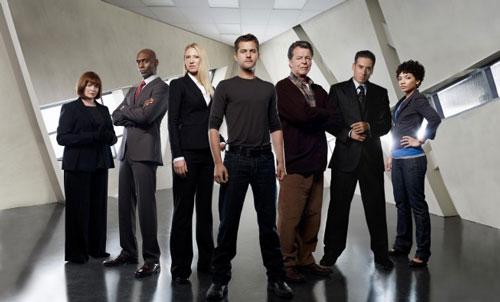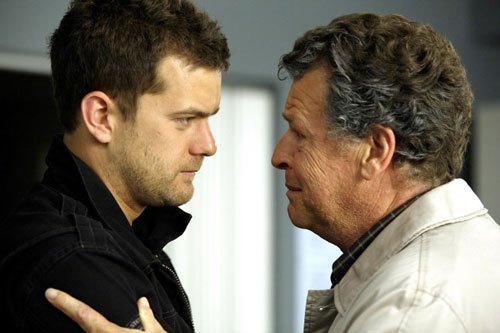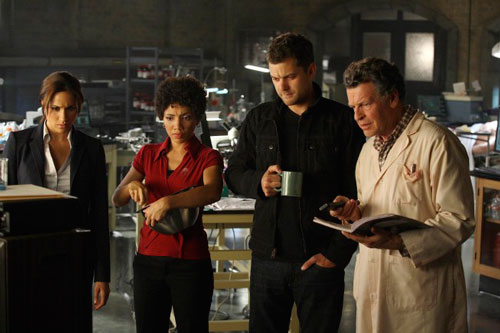Interview: Joshua Jackson on Fringe
As promised, here’s the transcript of the conference call with Joshua Jackson about his role as Peter Bishop in Fringe. (Sidenote: this wasn’t a one-on-one interview, but rather a conference call session with multiple bloggers and journalists)

Q: What do you enjoy more as an actor or even as a viewer, when you get to do an episode in which there’s lots of action, fighting, racing around or when it’s crazy science elements or when it’s simply doing a scene with the cow?
J. Jackson: The cow’s a diva; it’s a little known fact. She’s not very giving. I don’t know that I have a particular favorite. I think if I did any one of those things too much each one would become boring in their way. The hope is to try and balance those things out as much as possible, if not in every episode, in every couple of episodes. I would tell you that the thing I spend time thinking about is trying to keep the dynamic between Peter and Walter truthful and growing, but the beauty of being on a television show is that you get to do a little bit of everything all the time.
Q: What is your reaction when you get the scripts and it’s some new crazy thing that they’re bringing into the story?
J. Jackson: That’s the beauty of our show; if we don’t have a new crazy thing, something’s gone horribly wrong so I take it always as a positive thing. Each week it’s a little bit of a science lesson for the class, it’s a little bit of a vocabulary lesson for the class and it always presents you with some other kooky thing.
As a fan, the things that I like most about our show, the genre that our show is in is the bigger story rather than the individual creepy, gooey stuff. What we’ve done pretty well is to make each one of the creepy, gooey things add up into a much bigger story. That’s the thing that I peak out on that I thing is so cool.
Q: Did you see the twist in the finale coming? The twist involving you?
J. Jackson: They thankfully gave me a heads-up a couple months before that happened so that I didn’t read it and think that I had been fired. It sounds a little bit like a tag line, but it is the truth. The great thing about our show is that if we can dream it we can do it. I don’t think anybody really saw that twist coming. I was only told about it four or five months in advance, but I think that’s amazing. To put the last frame of the show in the World Trade Center is incredible. I love our show for that. It should keep on pushing boundaries and envelopes like that.
Q: Going forward now what can you tell us about that particular story line? How much do you know as far as what we can expect towards the first half of the season of that particular story line, as I said?
J. Jackson: The Peter story line, what I love so much about that beyond the “ain’t-it-cool” factor, is now the audience knows something about Peter that he doesn’t know about himself, something crucial about him that he doesn’t know about himself. We come to find out that this is a large part of the guilt that Walter carries around is that he baby-snatched Peter as a young boy. Inevitably that information had to come out so while I don’t know the particulars much further than the episode that I’m shooting right now I do think eventually that has to come to a head and it will lead to a conflict between the two guys.
The entire first season for Peter and Walter was about this father and son reconnecting through the craziness of their circumstances and actually becoming something of a family, a very dysfunctional family, but something of a family. And Season Two has carried that forth. In the beginning Peter is really invested now in being part of this team and actually belonging to this Fringe family, but eventually he’s going to find out that this horrible happened to him as a child and that’s going to blow up his relationship with Walter and probably with Olivia I would imagine. To me, that’s the great thing hanging over Peter the entire season and it gives me something to move toward as they go forward.

Q: Do you think that Peter and Olivia will have some sort of romantic relationship or do you hope that they don’t? What are your feelings about that?
J. Jackson: My estimation I just kind of said it a second ago, which is that I feel like this is more of a family dynamic than a romantic dynamic. What’s unique and what’s great about our show is, as opposed to having just a leading man and a leading lady, you have this crazy father in the center of it. That would be a very, very awkward love triangle, so I don’t think they’re going to go in that direction. I see Peter and Olivia as more brother and sister rather than lovers on this show. Where they’re going to take it, I have no idea, but for right now I run under the assumption that this is father, son, daughter rather than boyfriend, girlfriend, dad.
Q: I really like the interplay between Walter and Peter and the asides that Peter obviously has. How much of the sarcasm is improvised versus scripted and how much is you versus Peter?
J. Jackson: I’ll give the writers credit. I’d say most of those lines are written, though there is, particularly in the scenes with John, John and I have a very strong working rapport and he’s a very playful actor. I mean that in a good way that he likes to keep things live and so you keep on testing and trying. Just to toot my own horn, I feel like I’m a bit that way myself. So I think a lot of the humor of those moments comes out of the two of us just playing around until we figure out something that pops out of it, though the scenarios are definitely written. I would say that Peter’s a much more cynical man than Josh is; his sarcasm has a tendency to be a lot darker than my sense of humor.
Q: When we first met you in the first season we got a sense of this kind of dark background that you had, doing arms dealing and such. Will we get back to that and what he was doing in his life away from his father and the life that he’s got now?
J. Jackson: Yes. We actually delved right into that very early in the season. We kept on hinting at it last year, but never showing it and it’s not a problem of the format of the show. It’s not called Peter’s Fringe. It’s difficult to put these characters’ back-stories into the show. That’s not true, not their back-stories; it’s difficult to put their outside lives into the show. Does that make sense?
Each episode has a central focus; however, we immediately understood what it was, what function Walter has as part of this Fringe team and we spent the first season explaining exactly why Olivia Dunham in particular, as opposed to any other FBI agent, had to be the center of this Fringe team. What we never really got into until the final episode, the final frames of the final episode, was why it is specifically that Peter needs to be a part of this. Now that we’ve brought him in, this season we’ve gone a lot deeper into actually showing rather than just talking about this prior life that he had.
Q: I know that J.J. Abrahams said that he was trying to keep the series accessible to new viewers. Do you think that can continue?
J. Jackson: Yes. We’re just starting the eighth episode this year and I would say that we are, I guess the eighth episode is a mythology-heavy episode. I’d say we’re about 50/50 for episodes that are heavy into the big back-stories and stories that are just sort of one-off investigations. The idea is also that regardless of whether it’s a mythology episode or part of the larger story or not, each one of these investigations in every episode will always have a beginning, middle and end. Even it is a heavy mythology episode you can still tune in and get a satisfying story as opposed to tuning in to the story halfway through.
Everybody uses Lost as an example and let’s use it again because it’s J. J.’s show. Lost is a fantastic show, but each one of those episodes doesn’t really have a beginning, middle and end, it’s part of a continuing story. So if you don’t know the things that have come before it’s incredibly difficult to just drop in, which is just what Lost is. We should be so lucky to be as good as Lost on our show. The difference being that the format of our show lends itself to simpler storytelling, which is that every week there’ll be something that this group of people has to investigate. Sometimes it’s going to lead them to learn something about the larger story that they’re investigating that if you don’t know anything about that, you probably won’t be engaged by that. But regardless it will still come to an end that episode.
That’s one of the conceits of Fringe that if you want to pay attention every week there’s a lot of story being told all the time, but if you just want to tune in, drop in for a fun hour away where you get to cringe at the bad stuff and root for the good guys and hiss at the bad guys, there’s that aspect, too. It doesn’t turn you away at the door.

Q: Like any new show, Fringe had its share of ups-and-downs during the year, but then I think it had a really strong second half. When do you think the show really found its own voice, its own style and what kind of show it wanted and should be?
J. Jackson: I think right around the midway point of last season the show sort of decided what it wanted to be. From about the midway point it got on a pretty good streak of episodes there from, I think, either Ten and Eleven or Eleven and Twelve or Twelve and Thirteen, I can’t remember the exact number, but the two-part episode where Dunham gets kidnapped. After that it was pretty clear; we introduced the bad guys for the season and there was a much clearer narrative drive through the rest of the season.
I would say, though, that I don’t think the look of the show changed. I think visually the show always knew what it wanted to be. I think that what we were trying to figure out was the alchemy, what proportion was going to be a serialized show, what proportion was going to be one-off. We were still discovering who the character was. I think it was much more about the storytelling than it was about the look of the show in the first season, like every show, frankly, has to figure out.
Q: Obviously the show deals with parallel universes. Has this opened up your mind to the idea of parallel universes and what do you think about the probability that there might be a parallel version of yourself in some universe?
J. Jackson: I do think this idea is part of the zeitgeist right now. Maybe it’s my West Coast, liberal upbringing, but the idea of parallel universes doesn’t really strike me as being too far out there. After the 60s and after all the psychedelia and the doors of perception and what-have-you, I don’t think it’s really all that far out.
What defies my imagination is that there would be nothing out there that would defy my imagination and maybe it’s because I’m a sci-fi fan. It just seems like the only justifiable position that a human can have in 2009 is humility in the face of the universe. We’re learning so much and everything that we learn, it’s like that Carl Sagan thing, the candle in the dark. Every time the candle gets a little bit brighter it only serves to illuminate how much we still don’t know.
Q: The show’s being called a cross between, I guess, The X Files and Dark Angel and a couple other sci-fi shows. What’s your opinion about that?
J. Jackson: I don’t really get what the Dark Angel reference would be. Oh, maybe because Dunham was experimented on when she was a kid perhaps. I don’t know. I think The X Files is a more fair comparison, but even in the opening credits, The X Files, by design, dealt with things that were supposed to be part of the paranormal, what Fringe is trying to say is that these things that we would normally classify as fantastical are actually part of the normal. They all have legitimate explanations in the scientific world; they can’t be chalked up to alien possession or fairies or Dracula.
Q: You’re a big science fiction fan. I was wondering if Fringe satisfies all of your science fiction needs or is there some science fiction plotline out there that you’re really just dying to do.
J. Jackson: Of course, Fringe doesn’t fill up the science fiction quotient of my acting life. I don’t know if there’s any particular; it’s hard to say that you’d be dying to do something because it’s probably already been done, but there’s an infinite number of stories out there. There are plenty of books that I read as a young man that I would love to turn into movies, some of which have already been turned into movies.
It is a ton of fun for a guy who loves science fiction to be working on a science fiction show. Like I said to the guy before you, none of the concepts that are raised on this show are entirely foreign to me or do they seem that far out there, but I’ve never worked on a show before where we get to actually explore those ideas.
Q: One more quick thing. I just want to know what it’s like working with Leonard Nimoy.
J. Jackson: I’ve been shafted so far; in fact I’m going to lodge a formal complaint through this conference call. Leonard’s been up here twice and while I did get to meet him and that’s cool, I have yet to be able to do a scene with him and I think that’s un-cool.
Fringe premiered last night on Fox in the US, and airs weekly on Thursday 9:00 PM.
